


Crux Australis Herald
Baron Uberto Renaldi [mka Nigel Castle]
GPO Box 2719, Adelaide SA 5001, Australia
phone: (08) 8336 6791 or intl +61 8 8336 6791
 |
Crux Australis Herald |
"The CAMeL"
August 2001 (Anno Societatis XXXVI)
Unto the College of Heralds of the Principality of Lochac, and all others who may read this missive, from Baron Uberto Renaldi, Crux Australis Herald, greetings!
In this issue…..
Lochac’s new arms now official | Reports | Changes to the Rules for Submissions | Roster changes | Important addresses
Subscriptions and Resources | Submission requirements | Meeting schedule | Recent submissions | News of previous submissions
Saint-Florian investitiure thanks
My thanks to those who assisted in the heraldry at the Saint-Florian-de-la-rivière Baronial Investiture, especially Lord William Addemere, Lord Declan of Drogheda and Baron Humphrey de la Pole. Thanks also to the musicians who played processional music at the courts - fabulous!
Your servant,

Baron Uberto Renaldi,
Crux Australis Herald
Lochac’s new arms now official
As of July, the officially registered arms of Lochac are the new "kingdom arms" of Quarterly azure and argent, on a cross gules a crown between four mullets of five points, in canton a laurel wreath argent.
Lochac’s "old" arms (the same, minus the crown) have been retained as "ancient arms", and I suggest that they continue to be displayed in preference to the new arms until after the first coronation next year.
The next quarterly reports are due on 10 September 2001.
Changes to the Rules for Submissions
The following changes to the Rules for Submissions were published in Cover Letter to Laurel’s June 2001 Letter of Acceptances and Returns (dated July 20, 2001). They are effective immediately.
The following rule is added:
VIII.7. Augmentations of Honor – An augmentation of honor must be compatible with period armorial style.An augmentation is an honor bestowed by the crown, taking the form of an addition or alteration to the honoree’s device. While the right to an augmentation is bestowed by the crown, its form is subject to the normal registration process. The augmentation must itself follow the armory rules; if it has the appearance of being independent armory, for example a charged escutcheon or canton, then it is independently subject to the normal rules of armorial conflict. The augmentation may, however, on a case by case basis break the rules in relation to the original armory. For example, Sable, on a chief argent a lion passant maintaining, in augmentation, an escutcheon gules charged with a cross throughout argent is acceptable even though it breaks RfS VIII.1.c.ii., Layer Limit. Gules, a lion argent, and in augmentation a canton argent charged with a tower Or is not acceptable, as the augmentation internally breaks RfS VIII.2., Armorial Contrast. Since an augmentation is an earned honor, it may in some cases violate RfS XI.3. Marshaling or RfS XI.4. Arms of Pretense and Augmentations of Honor. Arms in their augmented form are subject to the normal rules of conflict.
The text of RfS X.2 is changed to the following:
X.2. Substantially Different Charges – Simple armory does not conflict with other simple armory if the type of every primary charge is substantially changed.These types of changes were normally seen between complete strangers in blood, and were not usually used to indicate any form of cadency. For purposes of this rule, simple armory is defined as armory that has no more than two types of charge directly on the field and has no overall charges.
The following examples are simple, with at most two types of charge on the field: Argent, a fess sable. Sable, three lions Or. Vert, two eagles and a maunch argent. Vair, a bordure gules. Per pale gules and argent, a fess between three lozenges counterchanged. Or, on a chevron between three clarions gules, three garbs argent. Purpure, on a pale dancetty within a bordure semy-de-lys argent, a millrind sable between two roses gules.The following examples are all non-simple, with more than two types of charges on the field, or with one or more overall charges: Argent, a fess between two lions and a lozenge azure. Vert, a chevron between three swords, a bordure Or. Gules, a bend between two roundels argent, overall a lion Or. Per bend argent and sable, a bend gules between a tree and a cross crosslet counterchanged. Argent, a dragon sable, overall a bend gules.Argent, a fess sable does not conflict with Argent, a lion sable. Vert, two eagles and a maunch argent does not conflict with Vert, three lozenges argent. Azure, a fess between three cups Or does not conflict with Azure, a chevron between three cups Or. In each case the designs are simple and the type of every primary charge has been substantially changed.
Per chevron gules and argent, three oak trees counterchanged does conflict with Per chevron gules and argent, three fir trees counterchanged, because the type of charge has not been substantially changed; they both conflict with Per chevron gules and argent, two mullets and a fir tree counterchanged because not all of the primary charges have been substantially changed. Vert, two mullets and a clarion argent within a bordure Or conflicts with Vert, three gauntlets argent within a bordure Or because the first design is not simple, with three different types of charge on the field.
Lastly, the text of rule XI.4 is changed to the following:
XI.4. Arms of Pretense and Augmentations of Honor – Armory that uses charges in such a way as to appear to be arms of pretense or an unearned augmentation of honor is considered presumptuous.Period and modern heraldic practice asserts a claim to land or property by surmounting an individual’s usual armory with a display of armory associated with that claim. Such arms of pretense are placed on an escutcheon. Similarly, an augmentation of honor often, though not necessarily, takes the form of an independent coat placed on an escutcheon or canton. Generally, therefore, a canton or a single escutcheon may only be used if it is both uncharged and of a single tincture. For example, Argent, a fess gules surmounted by an escutcheon sable charged with a roundel argent has the appearance of being arms of pretense or an augmentation. Or, in saltire five escutcheons sable each charged with three roundels argent does not have this appearance, as it has multiple escutcheons, as so is acceptable. The exception to the restrictions of this rule is when the submitter is entitled to an augmentation as described in RfS VIII.7. Augmentations of Honor.
The Shire of Bacchus Wood now has a rostered herald: Yseult de Sancerre has volunteered to take on the office, and will be rostered as Acting Pursuivant Extraordinary for the Shire until she fulfills the requirements of a personal rank of PE.
Crux Australis Herald: Uberto Renaldi [Nigel Castle] GPO Box 2719, Adelaide SA 5001. Ph (08) 8336 6791. Email herald@sca.org.au
Hund Herald (West Kingdom external commentary) and Bombard Pursuivant (Ceremonies deputy): Thorfinn Hrolfsson [Steven Roylance] 1592 Malvern Road, Glen Iris VIC 3146. Ph (03) 9885 6348. Email roylance@corplink.com.au
Canon Pursuivant (Precedence and Gentry list): ): Morag Freyser [Helen Brinsmead] PO Box 455, Woden ACT 2606. Email the_brinsmeads@dingoblue.net.au
Mortar Pursuivant (Field and Voice deputy): Gwynfor Lwyd [Peter Ryan] 6 Merton Street, Springvale VIC 3171. Email prism@primus.net.au
Rocket Pursuivant (New PE test): Aislinn de Valence [Megan Dansie] PO Box 526, Unley SA 5061. Ph (08) 8293 6635. Email aislinn@merlin.net.au
Baryl Pursuivant (External commentary): Thomas Flamanc of Kelsale [John Sawyer] PO Box 222, Flinders Lane Post Offices VIC 8009. Email sawyer@lexicon.net.au
Subscriptions and Resources
"The CAMeL" is available from Crux Australis at $20 per year. Make cheques payable to "SCA Inc. College of Heralds".
Laurel's Letter of Acceptance and Return is available from the SCA College of Arms. Send a cheque for $US25 made out to "SCA Inc. — College of Arms" to Bruce R. Nevins, 2527 E. 3rd Street, Tucson AZ, 85716-4114, USA. As usual, everything of relevance to Lochac will be published in "The CAMeL".
The Armorial and Ordinary, as well as updates to them, are available from ‘SCA Inc. - Free Trumpet Press West’ in the USA. Their address is ‘1613 N. School St., Normal IL 61761-1240’. They also sell the ‘Heraldic Pictorial Dictionary for the SCA’, proceedings of Known World Heraldic Symposia and Compilations of Precedents by past Laurel Sovereigns of Arms. Contact me or see details of their web site below.
I also recommend that groups acquire some name resources, in particular P.H. Reaney & R.M. Wilson’s ‘A Dictionary of English Surnames’ and E.G. Withycombe’s ‘The Oxford Dictionary of English Christian Names’. The latter is out of print, so if you spot it at a second-hand book sale, buy it!
Useful or interesting links:
The SCA Heraldry web page - www.sca.org/heraldry including the Laurel home page and on-line armorial and ordinary search.
The Academy of St. Gabriel (an heraldic consultation service) - www.s-gabriel.org
West Kingdom Heralds' Handbook - heralds.westkingdom.org
Free Trumpet Press West (SCA heraldic publications) - www.sca.org/heraldry/ftpw.
Parker’s Glossary of Heraldry - http://www04.u-page.so-net.ne.jp/ta2/saitou/ie401
Cost: $20 per new submission (name, device or badge). Note: a new name and device costs a total of $40. No cost for resubmissions or branch submissions. Make cheques payable to "SCA Inc. College of Heralds".
Copies required:
Please include ALL necessary documentation to support each submission. It is the responsibility of the submittor to present their submission in a way that makes registration easy. Name documentation should be as accurate as possible: remember to include photocopies of the title page as well as the relevent page(s) of any source used.
Crux Australis submission meetings are held once a month, usually at 36 Rosella Street, Payneham SA, starting at 2pm. Please call beforehand if you intend to bring submissions for processing. The next meeting is scheduled for the 9th September and the one after that is scheduled for the 14th October (the day after the investitiure of the next Baron and Baroness of Innilgard, so I expect lots of interstate visitors!)
Present at the Crux Australis Submissions Meeting held on Sunday 12th August 2001 at 36 Rosella Street, Payneham SA were: Baron Uberto Renaldi, Crux Australis Herald; Lord William Forester de Blacwode, Frette Rouge Pursuivant; and Lord Gryffyd ap Cynan and Wakeline de Foxley, heralds-in-training, who provided invaluable conflict-checking and decision-making assistance.
The following submissions were FORWARDED to the College of Arms for registration:
New Name (see RETURNS for Device)
The submittor desires an 11th century male Irish name and will accept major changes. Documentation was provided from the Academy of Saint Gabriel (client #2150). The name is in the form given name + epithet mac patronym h-Úi clan name.
edán: C&M list this as being "a relatively common name in early Ireland, both for clerics and laity."
Áóc: Old Irish for "young, junior".
Rónáin: C&M list ‘Rónán’ as "a relatively popular name in early Ireland." ‘Rónáin’ is the genitive form.
Fáeláin: C&M list ‘Fáelán’ as "a common early name" and that "there were three kings of Leinster of the name between the seventh and ninth centuries." ‘Fáeláin’ is the genitive form.
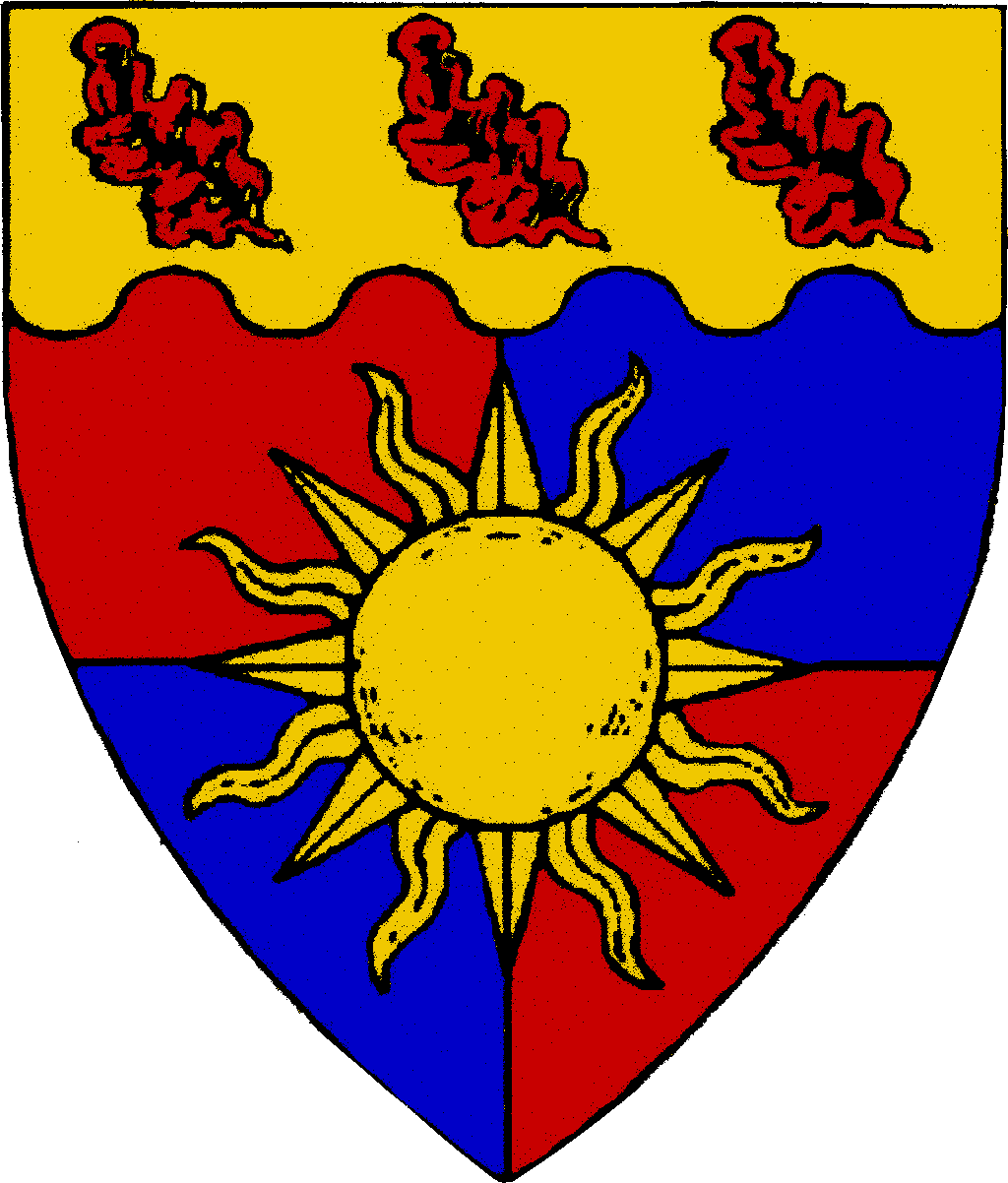
New Name and Device
Quarterly gules and azure, a sun and on a chief wavy Or three oak leaves bendwise gules.
The submittor desires a 16th century female English name and will accept minor changes only.
Bess: diminutive of ‘Elizabeth’ which, according to Withycombe, was "common in the 16th century".
Buckland: Ekwall lists this as "a common [place]name", found mainly in the south of England. Although Ekwall does not give this spelling, Mills lists ‘Newton Buckland’ (under ‘Buckland’) dated to 1576.
The device is quite similar to, but clear of, Gules, a sun in splendor and on a chief wavy Or three roses leaved gules (device registered to Magdalen MacKenzie in September 1997). There is one CD for changes to the field, and another for changing the type of the charges on the chief.
Note that this second CD is granted only because the device being submitted is a "simple case" as per RfS X.4.j.ii.(c): armory that has an uncharged primary charged group and a peripheral ordinary charged with a group of identical charges. In such cases, changes to the type of charges on charges is sufficient to generate a CD.
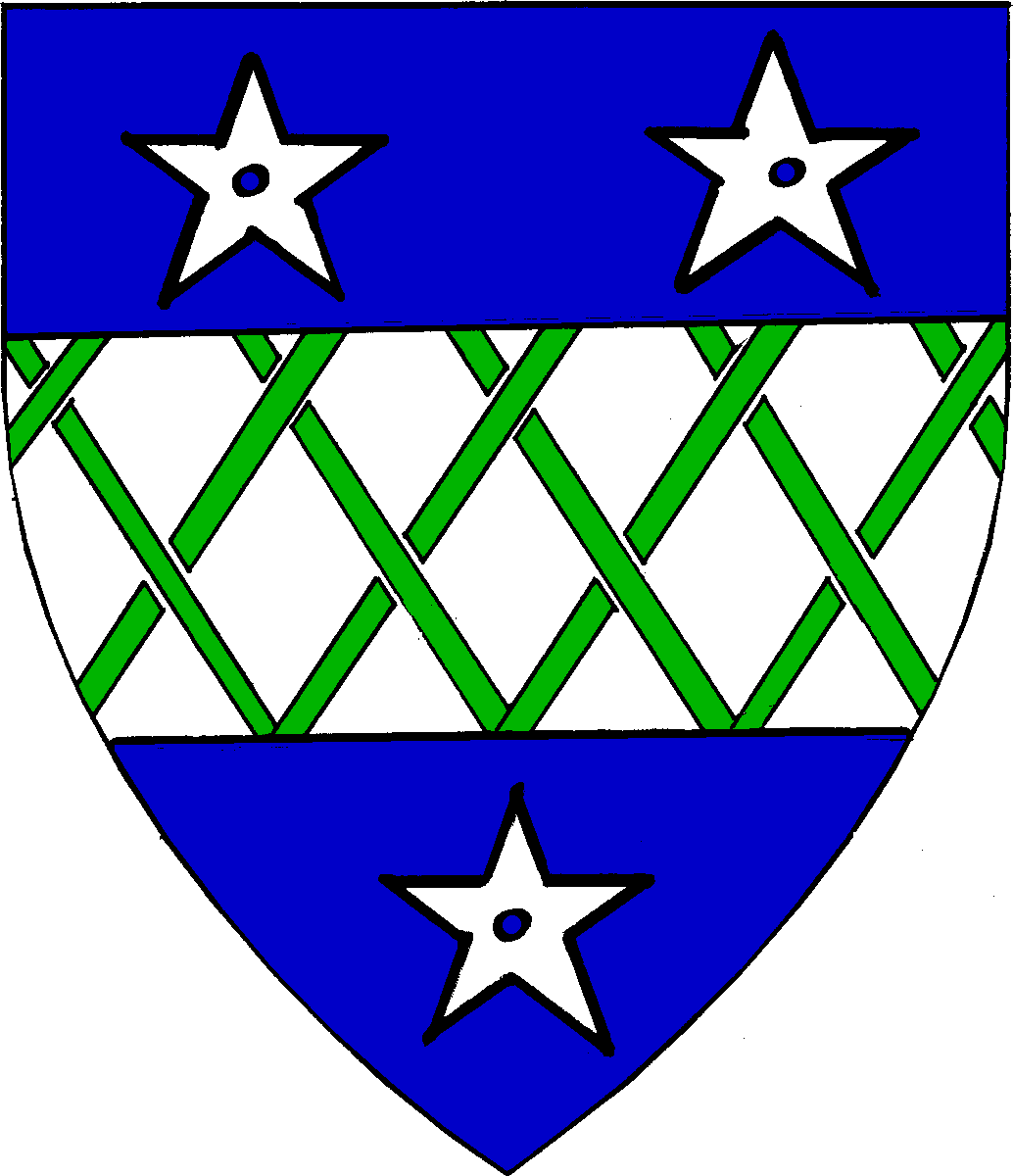
Device Resubmission to Crux
Azure, a fess argent fretty vert between three mullets pierced argent.
Emma’s previous device submission, identical in design to this one, was returned by me in May 2001 as the piercings on the mullets were too large and the fretwork was too thick (giving the appearance of a fess vert lozengy argent). This redraw has corrected both problems.
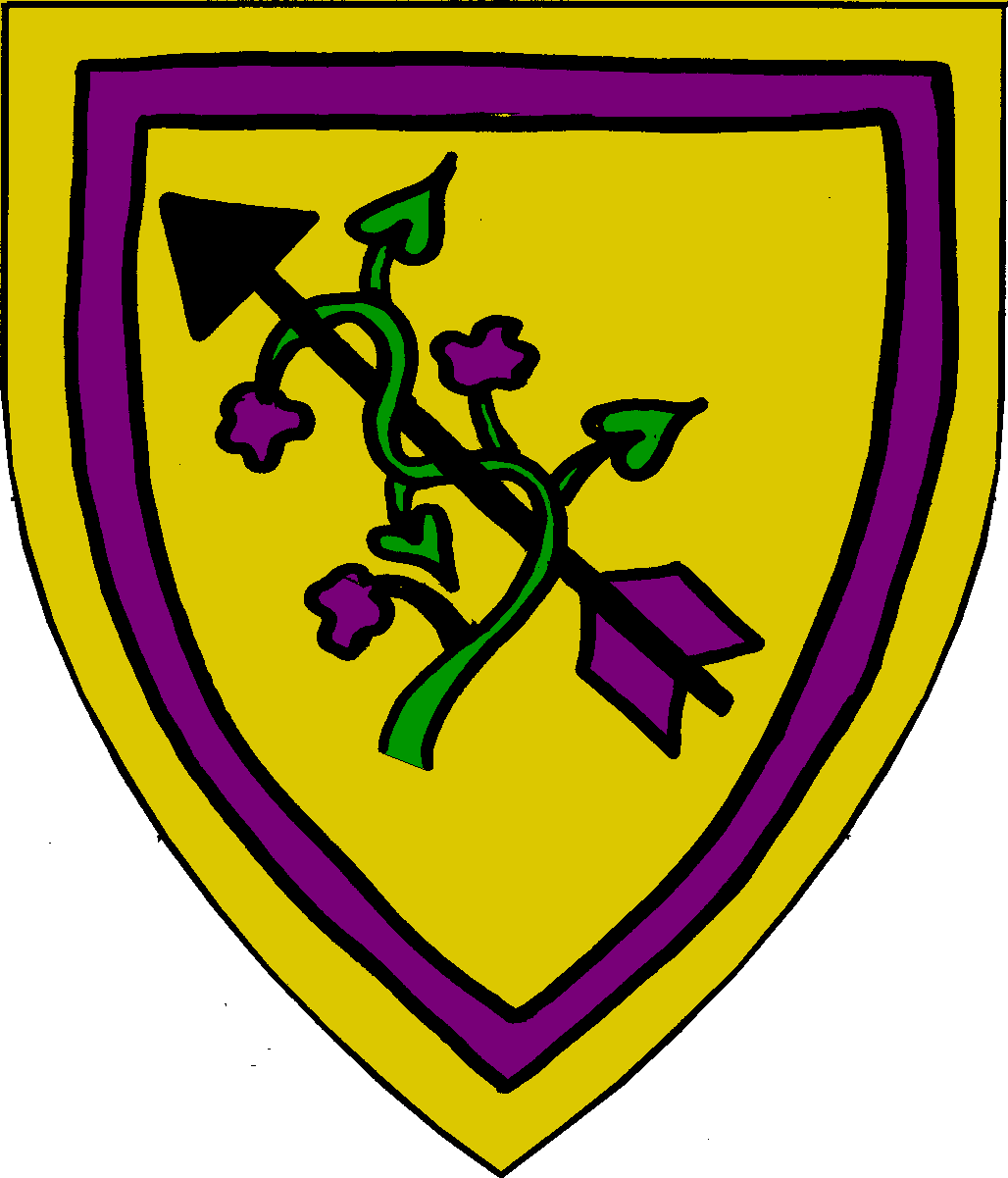
New Name and Device
Or, an arrow inverted bendwise sable, flighted purpure, entwined with a morning glory vine vert, flowered purpure, all within an orle purpure.
The submittor desires a late 12th century female Irish name and will accept minor changes only.
Fína: Jones lists this as an early 12th century Irish feminine name. C&M also list ‘Fíne’ as the name of an abbess of Kildare who died in 805.
Scolaighe: MacLysaght, under ‘(O) Scully’ gives the early form of ‘ Scolaidhe’, whilst C&M give ‘Scolaighe’ as a variant of the personal name ‘Scolaige’, meaning "scholar, schoolman". ‘ingen uí’ is Irish for "granddaughter/female descendant of".
Name resubmission to Crux
This gentle’s previous submission of Hanbal Al’Zaki Wahidi was returned by Vesper in June 1996 for grammatical problems. He desires a male Arabic name, cares most about the sound and culture, and will accept minor changes only.
Hanbal: Appleton lists this as a period Arabic male given name.
al-Barbari: According to an online essay by NHM Keller on "The Re-Formers of Islam" [sic], an ‘Ikrima ibn Abdullah al-Barbari’ died in 723. According to several websites on the Maldives, Islam was introduced to those islands in 1153 by one ‘Ab al-Barakaat Yoosuf Al BarBari’ (or ‘al-Barbary’). I realise that this is not the most desirable form of documentation, but the Crux Australis library has nothing on Arabic names and I sincerely doubt the submittor can provide anything more useful. Therefore, I am asking for help (and leniency) from the College of Arms on this one.
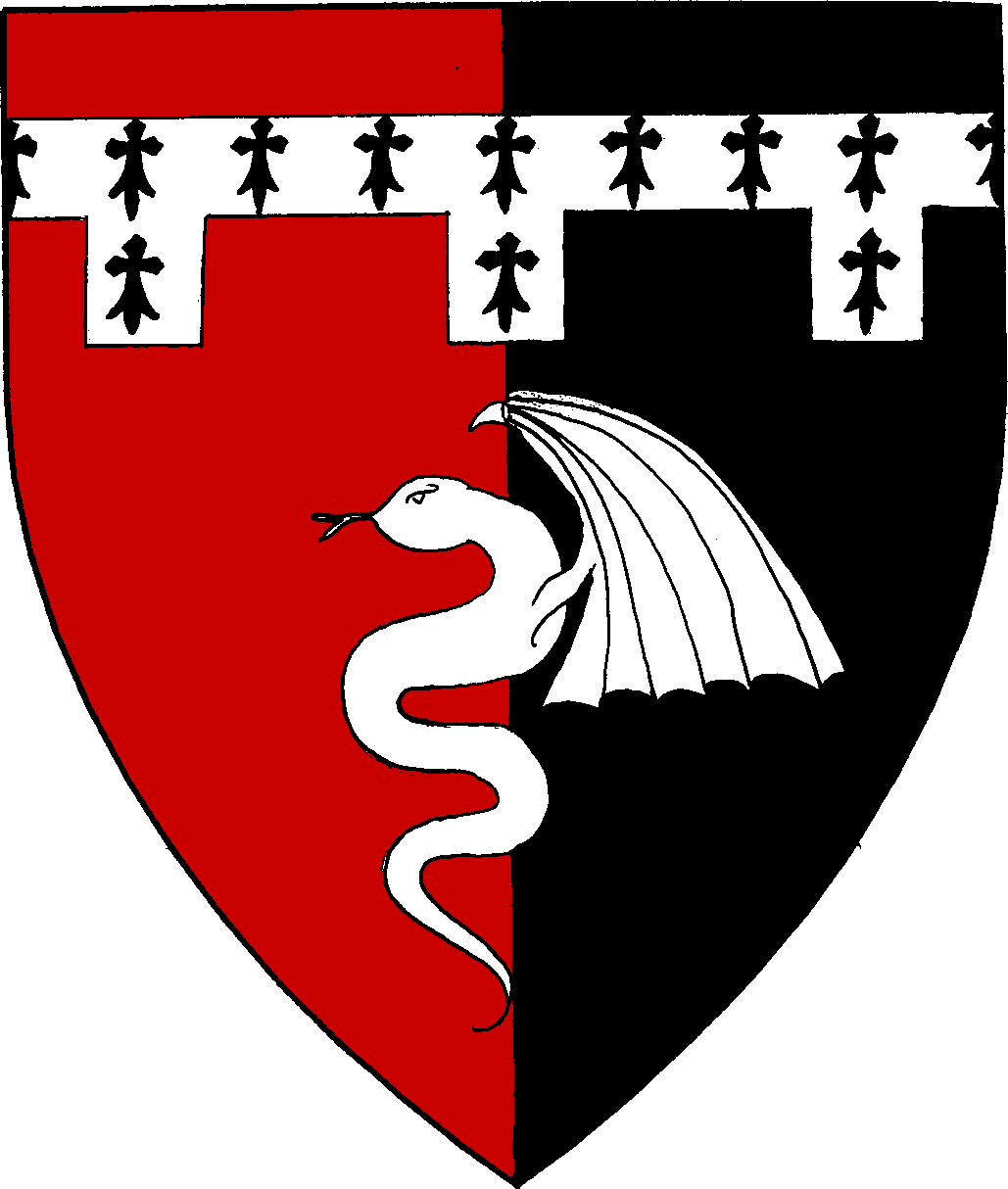
Device Resubmission to Crux
Per pale gules and sable, a pithon argent and a label throughout ermine.
This gentle’s previous device submission was returned by me in May because the pithon’s body was tilted to be halfway between palewise and bendwise. This redraw has corrected that problem.
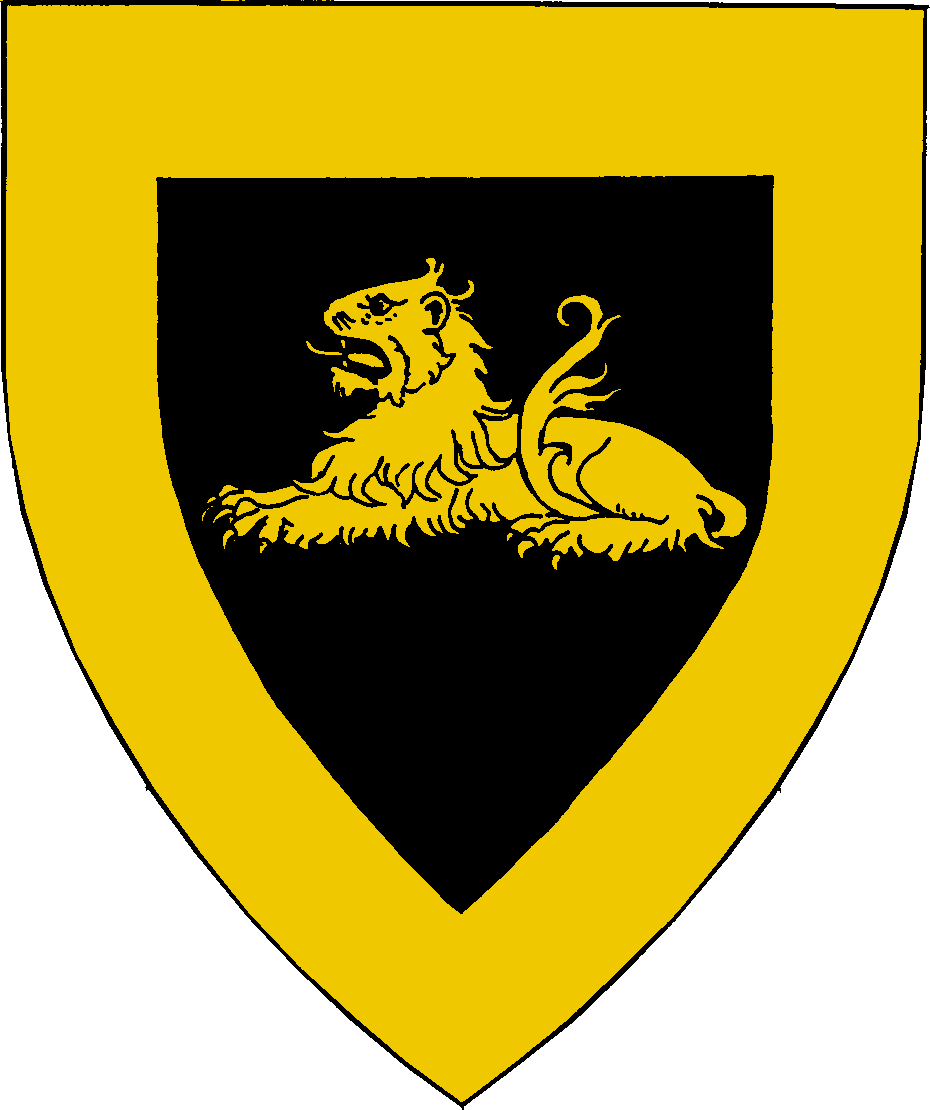
New Name and Device
Sable, a lion couchant and a bordure Or.
The submittor desires an 11th century male English or ‘Viking’ name and will accept minor changes only.
Magnus: Geir Bassi (p.13) lists ‘Magnús’, whilst a report from the Academy of Saint Gabriel (client #1577) reports that the use of the accent was irregular in period writing (and thus its omission from the submitted form).
egjandi: Old Norse epithet meaning "silent", which Geir Bassi (p.29) lists as a byname appearing in the Icelandic Landnámabók.
The device is in conflict with Sable, a lion couchant, its head a sun in splendour Or (badge registered to Natalya de Foix in April 1988, via Caid): there is one CD for removing the bordure, but not another for changing the lion’s head from a sun in splendour to a normal head. Fortunately, Natalya has given Magnus permission to conflict.
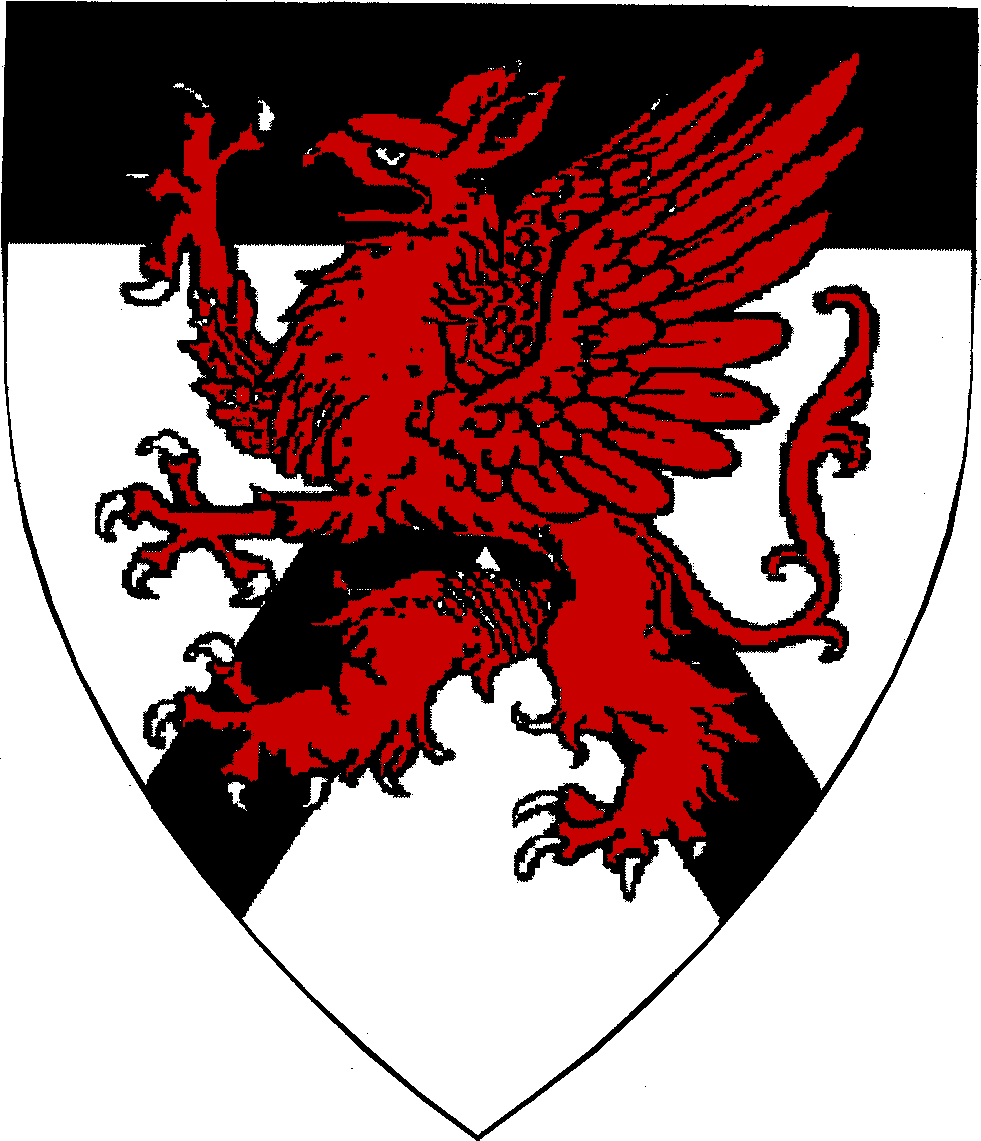
New Name and Device
Argent, a chevron and a chief sable, overall a griffin segreant gules.
The submittor desires a male name (presumably Anglo-Norman) and will accept major changes.
Miles: Withycombe dates this spelling from the 15th century.
Colwell: Town in Northumberland, which Ekwall dates in this spelling to 1318. It is also the submittor’s legal surname.
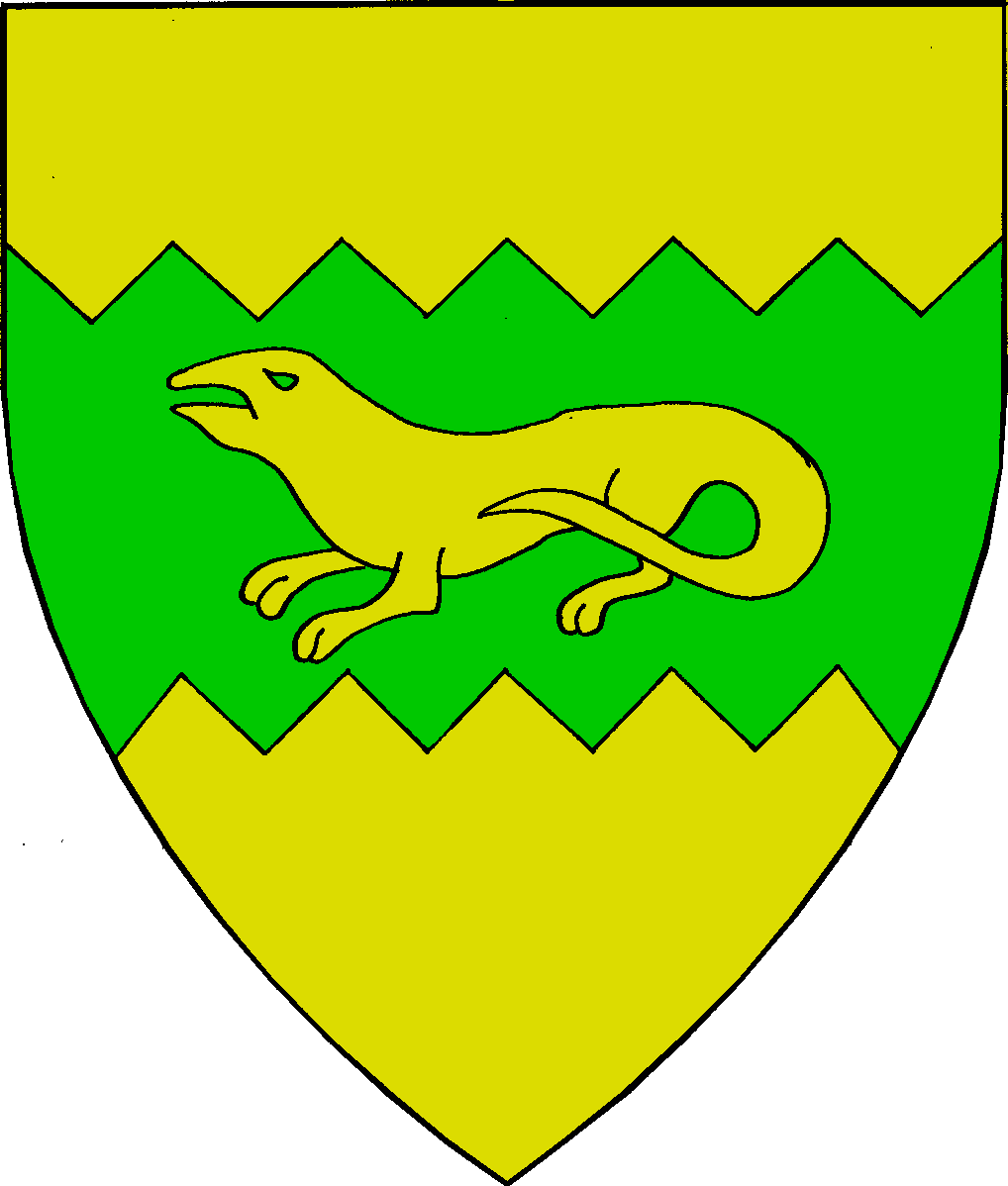
New Name and Device
Or, on a fes indented vert a natural salamander passant Or.
The submittor desires a male name (presumably Anglicised Russian) and will accept major changes.
Olekh: Goldschmidt[1] lists this as a variant of ‘Oleg’.
Kiev: Goldschmidt[2] lists Kiev as a place used in Russian locative bynames, with dates ranging from 1167 to 1564.
On researching the history of Kiev, I found several references to a Varangian leader called Oleg who captured the city in 882 and whose successors made it the capital of the Kievan Rus state. However, based on the examples given in section VI of the RfS, this does appear to make the name presumptuous.
One of the four people present at the meeting recognised the beastie on the device as a natural salamander, and more were in favour of forwarding it to Laurel than returning it, so I have.
The following submissions were RETURNED for further work:
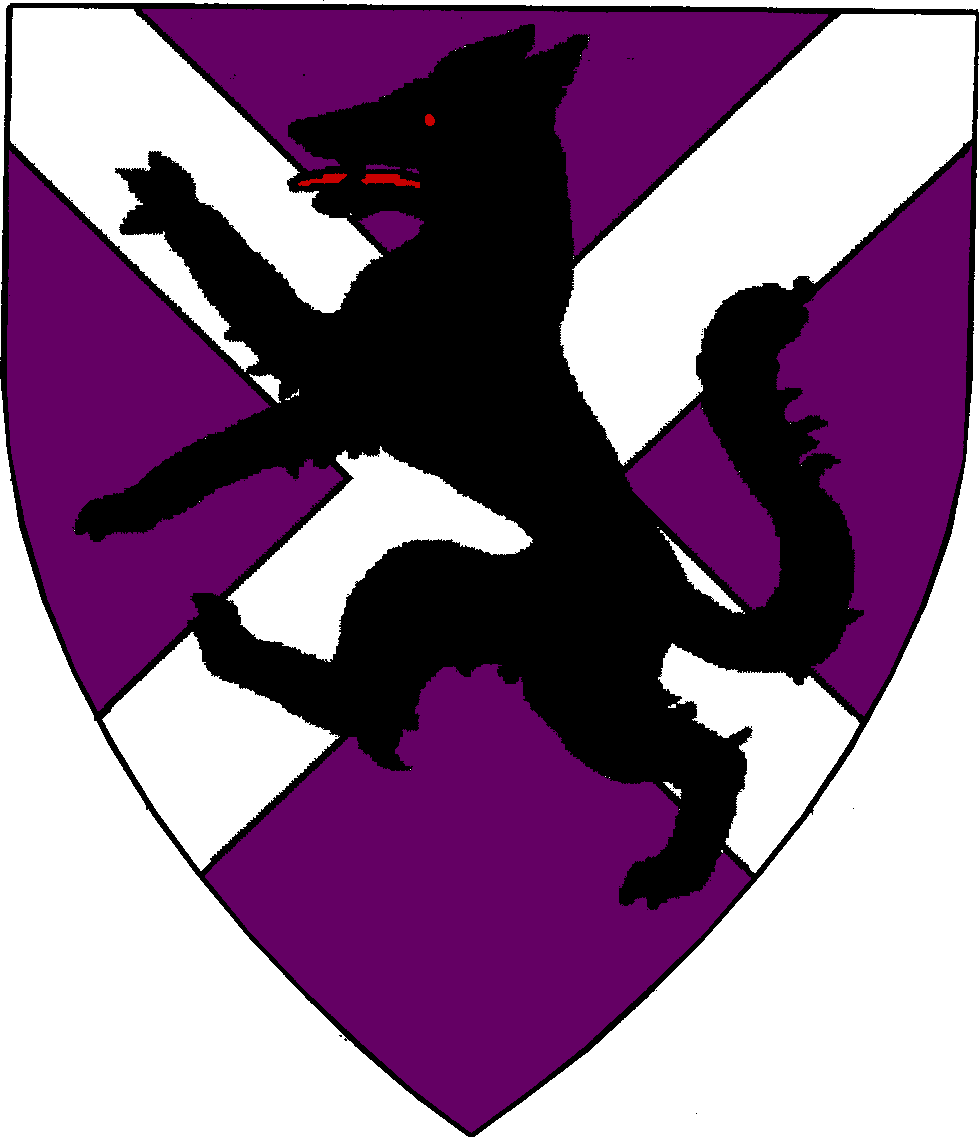
New Device
Purpure, a saltire argent and overall a wolf rampant sable.
This simple and striking device unfortunately falls afoul of Rule VIII.2
b. Contrast requirementsi. The field must have good contrast with every charge placed directly on it and with charges placed overall. For example...a field vert with a fess Or contrasts with a wolf rampant overall that is argent or ermine, but not a wolf that is gules or sable.
In this case, the wolf sable has poor contrast with the purpure field, so the device must be returned despite the fact that over half of the wolf is overlying the saltire (against which it has very good contrast).
New Branch Name
We could find no evidence (and none was provided) of period placenames having the form "X’s Isle", and the group opted to accept no changes to their submission.
Based on the documentation we could find, "Isle Hunters" would be fine, whilst "Huntingsey" is a possibility. "Hunter Island" may also be legal, but do they really want their group’s name to sound like a Reality TV show?
References cited
Appleton, D. ‘Arabic Naming Practices And Period Names List’. http://www.s-gabriel.org/names/daud/arabic-naming/
Ekwall, E. ‘The Concise Oxford Dictionary of English Place Names’. 4th edition., Oxford University Press, 1991.
Geirr Bassi Haraldsson. ‘The Old Norse Name’. Yggsalr Press, 1977.
Goldschmidt, P. [1] ‘Dictionary of Period Russian Names’. http://www.sca.org/heraldry/paul/o.html
Goldschmidt, P. [2] ‘Locative Bynames in Medieval Russia’. http://www.sca.org/heraldry/laurel/names/toprus.html
Jones, H.R. ‘Early Irish Feminine Names from the Index to O’Brien’s Corpus Genealogiarum Hiberniae’. http://www.s-gabriel.org/names/tangwystyl/obrien/
Keller, N.H.M. ‘The Re-Formers of Islam. The Mas’ud Questions’. http://dspace.dial.pipex.com/masud/ISLAM/nuh/masudq5.htm
MacLysaght, Edward. ‘The Surnames of Ireland’. 3rd edition. Irish Academic Press, 1978.
Mills, A.D.. ‘A Dictionary of English Place Names’. Oxford University Press, 1991.
C&M = Corrain, Donnchadh and Maguire, Fidelma. ‘Gaelic Personal Names’. The Academy Press, 1981.
Reaney, P.H. and Wilson, R.M. ‘A Dictionary of English Surnames’. Revised 2nd edition. Routledge London 1979.
Withycombe, E.G. ‘The Oxford Dictionary of English Christian Names’. 3rd edition. Oxford University Press, 1979.
From Laurel’s June 2001 Letter of Acceptances and Returns:
ACCEPTANCESAlice de Durham. Name and device. Per bend sinister embattled argent and azure, two crosses of four lozenges counterchanged.RETURNS
Arrowreach, Canton of. Device. Per fess indented of three points azure and argent, in pale a laurel wreath Or and two arrows crossed in saltire inverted gules.
This was pended from the November 2000 LoAR.
Brúsi of Dragonvale. Name change from Little Brúsi of Dragon Vale.
His former name is released.
Constanzia Moralez y de Zamora. Device. Gules, a cross of Santiago, on a chief argent three crescents sable.
Cynethryth Dall. Name and device. Argent semy of roundels, a bordure sable.
Nice armory!
Liadan ingen Glassain. Name.
Submitted as Líadan inghean Glaisín, she requested an authentic Irish name. We have therefore changed the byname to be temporally compatible with the given name. As the name was originally submitted without accents we have removed them throughout.
Lochac, Principality of. Device change. Quarterly azure and argent, on a cross gules a crown between four mullets of six points, in canton a laurel wreath argent.
Their current device, Quarterly azure and argent, on a cross gules four mullets of six points and in canton a laurel wreath argent, is retained as Ancient Arms as per the recent changes to the Administrative Handbook.
Philipe du Lac. Name and device. Gules, two swords crossed in saltire argent, on a chief ermine two roses proper.
Submitted as Phillipe du Lac Bleu, he requested an authentic 15th century French name. No documentation was provided for the spelling of the given name, and we have changed it to the closest documented spelling. Also, no evidence was provided to support the place name "Blue Lake", so we have changed that to "Lake".Gabriel de Beaumont. Device. Per pale sable and azure, a dexter wing and a sinister wing argent.
Conflict with Francois le Féroce, Per chevron vert and argent, in chief two wings addorsed argent. There is one CD for changes to the field, but none for the change of the location of the wings, as the location of Francois’ wings is forced.
From Laurel’s July 2001 Letter of Acceptances and Returns:
ACCEPTANCESKonrad Athalwolf. Name.RETURNS
Submitted on the LoI as Konrad Adelwolf, we have changed the name back to the originally submitted form.
Liadan ingen Glassain. Device. Argent, a triquetra within a bordure embattled purpure.
Richenza d’Assisi. Name and Device. Per pale argent and vert, a grape leaf inverted within an orle counterchanged.
The name was documented as having a Polish given name with an Italian byname, but no evidence was provided that Poland and Italy were in sufficient cultural contact that the combination is registerable.
However, the given name seems not to be limited to Poland: for instance, it was borne by the daughter of Henry the Fat, Duke of Saxony, who later married Lothar II, Holy Roman Emperor. The contact between Germany and Italy was sufficient to allow registration.
The primary charge was blazoned as an oak leaf, but the emblazon shows a grape leaf.Saint Crispin, College of. Device. Per bend azure and argent, a seahorse naiant argent and and open book gules within a laurel wreath vert.
The presence of the seahorse makes the seahorse, book, and laurel wreath all part of the primary charge group, thus violating the rule of thumb in RfS VIII.1.a, Tincture and Charge Limit, limiting a single group to no more than two types of charges. [This is known amongst heralds as the "slot-machine" rule – Crux]